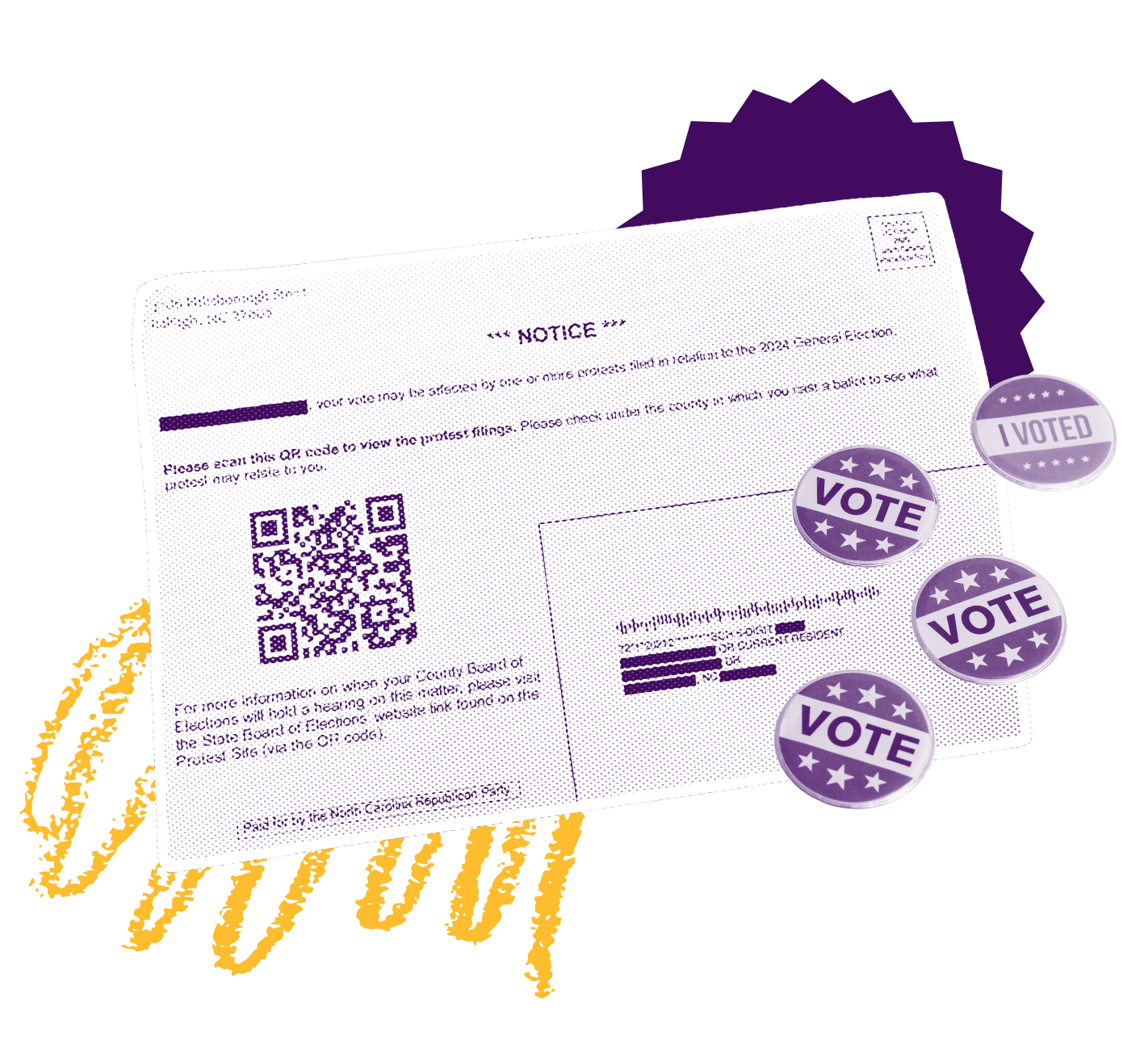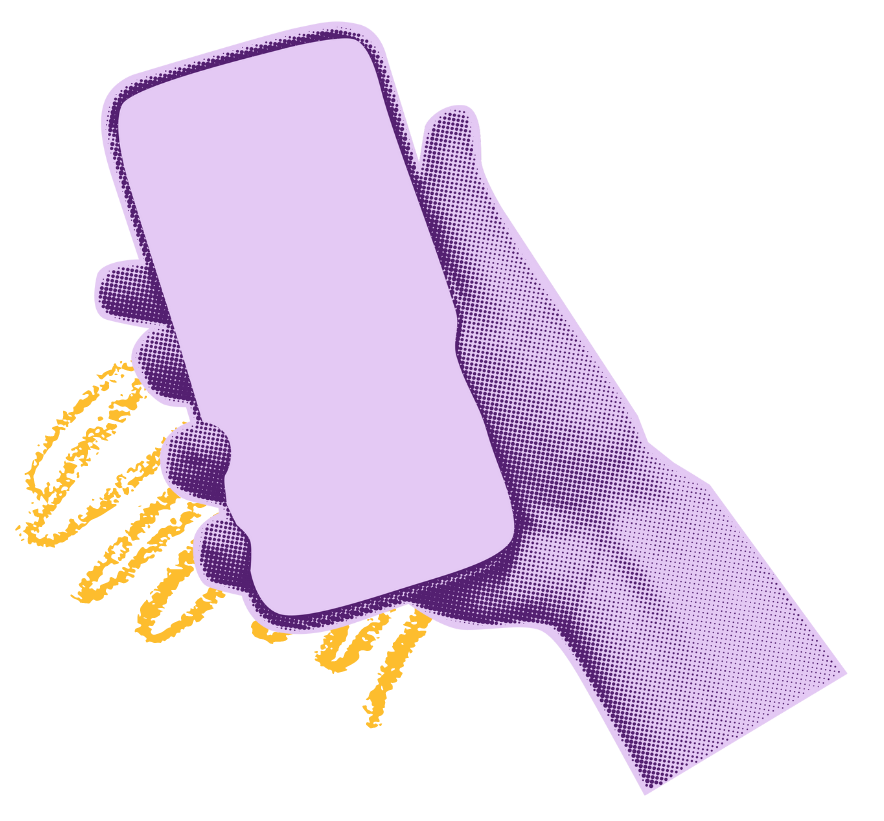VOTING RIGHTS
Explaining the North Carolina Election Protests
N.C. Supreme Court candidate Jefferson Griffin has challenged the validity of more than 60,000 votes cast in the 2024 General Election. This unprecedented attempt to change the rules of voting and discount ballots after they were cast has prompted months of deliberations in federal and state courts.
Two post-election recounts have confirmed that Allison Riggs, the incumbent N.C. Supreme Court justice, leads Griffin, a N.C. Court of Appeals judge, by 734 votes out of 5.5 million cast in what is now the only undecided race in the nation from the 2024 election.
Any voter concerned about their ballot or registration may call or text the nonpartisan Election Protection Hotline at 888-OUR-VOTE (888-687-8683) with questions or contact their local county board of elections.

These protests seek an extraordinary result: the disqualification of tens of thousands of lawful voters’ ballots and the invalidation of North Carolina election results across the state without any evidence that ineligible voters cast ballots. The protests seek to change the laws of the election after votes have been cast and thereby move the goalpost on voters who satisfied all the requirements to have their vote counted. The protesters have expressly stated they have no evidence of ineligible voting – but still seek to overturn election outcomes they wish were different. This is not what election protests are for, and not how democracy works. These protests should be forcefully rejected.
Update (May 7, 2025) — The North Carolina Board of Elections has officially certified Allison Riggs as the winner of the 2024 NC Supreme Court race and she was sworn in Tuesday, May 13, 2025.
The concession comes after a federal judge ordered the North Carolina State Board of Elections to certify Justice Riggs as the winner of the race, noting that changing election rules after the fact to disenfranchise voters violates the fundamental rights of due process and equal protection guaranteed by the U.S. Constitution.
“Jefferson Griffin’s concession is a long-overdue acknowledgment of the will of the people of North Carolina,” said Jeff Loperfido, Chief Counsel for Voting Rights at SCSJ. “While we remain deeply troubled by the North Carolina Supreme Court’s decision to retroactively disqualify lawful ballots, we are relieved that this relentless effort to undermine the voices of eligible voters has finally come to an end. This case should serve as a warning: efforts to rewrite election outcomes after the fact are unlawful, erode public trust and threaten the very foundation of our democracy.”
“Jefferson Griffin’s concession brings much-needed closure to a manufactured crisis that sought to cast doubt on the legitimacy of thousands of eligible voters—particularly Black and Brown voters, those serving our country overseas and those inheriting a legal connection to their home state,” said Caitlin Swain, Co-Director Forward Justice. “While the damage done by the North Carolina Supreme Court’s decision cannot be undone, we are heartened that the federal court recognized this anti-democratic challenge and that Griffin has finally abandoned the protests. Let this moment serve as a reminder: our elections must be decided by the voters, not overturned by political ambition or judicial overreach.”
Background
Before North Carolina’s 100 counties had even finished certifying their results, protests challenging those results were filed in a handful of races – two State Senate contests (SD 42 in southern Mecklenburg County and SD 18 in northern Wake/Granville Counties); two State House contests (HD 32 in Granville/Vance Counties and HD 24 in Wilson County); and one statewide contest, for North Carolina Supreme Court Seat 6. These various protests raise largely identical issues and are being considered by the various county boards of elections and the State Board of Elections presently and through the coming weeks. Per Order of the State Board of Elections, county boards are proceeding with consideration of the protests made on the basis of death, felony conviction, or removed/denied registrations. The State Board of Elections has taken jurisdiction over the protests made on the basis of statewide election law disputes: voters whose registration records are purportedly incomplete, overseas voters who did not provide a copy of their ID (and who are not required to do so by state law), and overseas voters whose parents are North Carolina citizens but who have never lived in the state (who are authorized to vote in North Carolina by state statute).
What Should I Know About the Election Protests?
State law allows candidates to argue that irregularities affected the election process and impacted the certified results of the election. But state law requires protesters to actually prove that these irregularities occurred, and that they cast doubt on the results of the election. The simple filing of an election protest or allegation of an irregularity is the beginning of the process, not the end of it. The claims must be carefully considered, and the burden is on the protesters to demonstrate the election results were tainted. Overturning an election result is an extraordinary outcome that requires extraordinary evidence. Protesters must provide that proof if they wish to undo the results of the election.
Need Help?
Want to receive updates from SCSJ about this case? Are you a challenged voter with more questions? Let us know by completing this form.
Call 888-OUR-VOTE if you have questions or concerns about a protest or challenge to your vote and trained nonpartisan election protection teams will help you protect your rights. If you want to speak directly to a non-partisan voting rights attorney, email Jeff Loperfido, SCSJ’s Chief Counsel of Voting Rights, at jeffloperfido@scsj.org.

